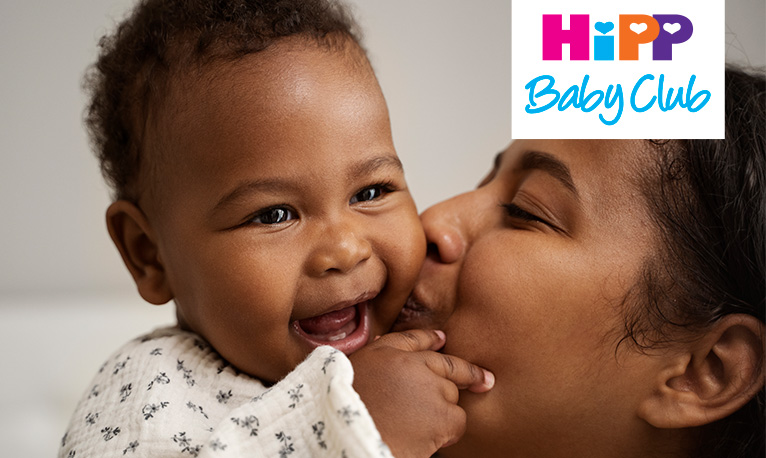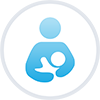Week 18
It's all action inside you at the moment - your baby is moving around, stretching, boxing, turning head over heels, thumb sucking, swallowing, and much more!
If you or your partner want to talk or sing to the baby, go right ahead – he or she is aware of sounds from outside and also hears your heartbeat and other body noises.
Your baby is nicely protected in the womb and receives all the nourishment needed through the placenta.
Changes in your body
As your uterus grows, it starts to exert pressure on the surrounding organs and blood vessels. This means that if you’ve been lying down or sitting for some time, you probably don't want to get up too quickly in case you become dizzy.
Your ligaments are also softening, which will come in handy during the birth, but also makes sprains or strains a bit more likely. You may also start to feel some back pain, particularly in your lower back, as your bump gets heavier and your centre of gravity changes.
It's a good idea to be extra-careful if you need to lift any heavy objects – or better yet, ask someone else to do it for you. A soothing back massage from your partner can help with mild aches and pains, but you should probably see your doctor or GP if any pain becomes severe or intense.
Swimming and walking are both excellent ways to help your body stay strong enough to handle the extra load you're under - and it's a good idea to start doing some pelvic floor exercises as well, if you aren't doing them already.
Be proud of your bump!
Some of the great advantages of being pregnant (besides not having to hold your tummy in) include thick glossy hair, that lovely glow and an amplified cleavage. Don’t be surprised if your partner thinks you're extra-gorgeous right now - many do!
You might also find that total strangers want to talk to you about pregnancy or babies - lots of people just love pregnant women! This doesn't mean, of course, that you have to put up with intrusive comments, but if you're keen to chat about your pregnancy, you'll almost certainly find lots of people to do it with!
Top tips
- A breastfeeding pillow can help you sleep better.
- It's good to raise your legs every now and then and to take breaks when walking.
- Wearing flat shoes will make walking easier.
- Iron-rich foods are recommended.
What it’s like for the mum-to-be in week 18
In week 18, you’ll be full of beans. You’ll want to create a safe and comfortable home for your future family, and your creative juices will be flowing. Even though you’re making all these plans and acting on them, however, don’t overdo it – there’s still plenty of time before the baby comes.
You should now avoid lifting heavy objects, e.g. baby furniture, and shouldn’t be on your feet for too long at a time. One thing you can do to avoid spider veins (varicose veins) and help your legs is take sufficient breaks and sit or lie down with your legs in a raised position.
Something else you might have noticed is that your centre of gravity has shifted as your bump has grown. So practise keeping your balance by alternating between putting your weight on one foot and then on the other when you’re standing up.
Unreliable blood pressure
You may feel dizzy every now and then. This is because your body is having to work very hard and is transporting more blood around your body through your blood vessels. Your blood pressure is currently a bit lower than normal and may drop rapidly for a few moments if you’re doing something strenuous, which can make you feel faint. If this happens, sit or lie down with your legs in a raised position. It won’t take long for your body to adjust, and you’ll soon feel better.
Your doctor or midwife can test regularly to see if your blood pressure is consistently too low. In almost all cases, low blood pressure can be resolved with conservative therapy to suit the rhythms of everyday life during your pregnancy. Vein training, which involves tensing and relaxing your leg muscles, can also help with low blood pressure and varicose veins.
Your body feels different
As you excitedly watch your growing baby bump, you’ll notice that your body is beginning to feel different. Walking will become more of an effort, your legs will feel heavier and you’ll need more breaks than before – this is completely normal.
You might also find it harder to get to sleep if you normally sleep on your back, because your belly will be pressing down on your organs and blood vessels. A breastfeeding pillow (if you’ve already got one) can help you sleep comfortably on your side if you put it between your legs.
You frequently feel tired
It's completely normal to feel tired more often (there’s a lot going on inside you, after all), as during pregnancy you need lots of trace minerals which you might not always get. Therefore, we recommend that you increase your iron intake, as iron binds the oxygen in your blood and helps both you and your baby get the oxygen you need. Focus on eating meals and drinking juices that contain high amounts of iron, such as a mild juice with red fruits.


